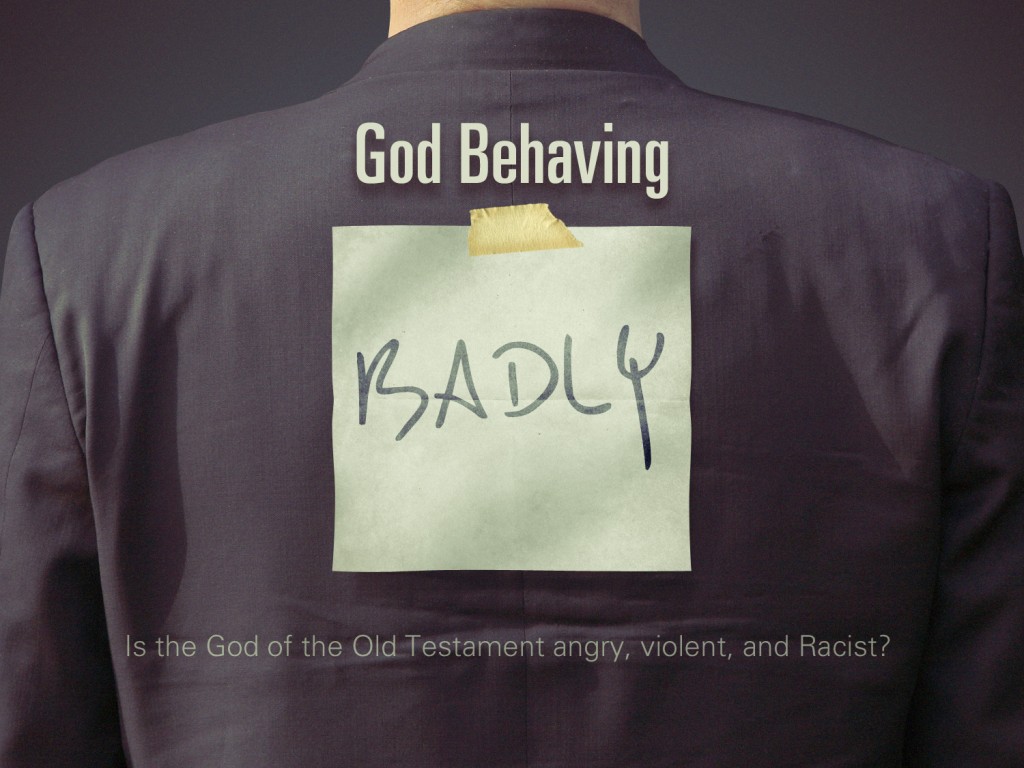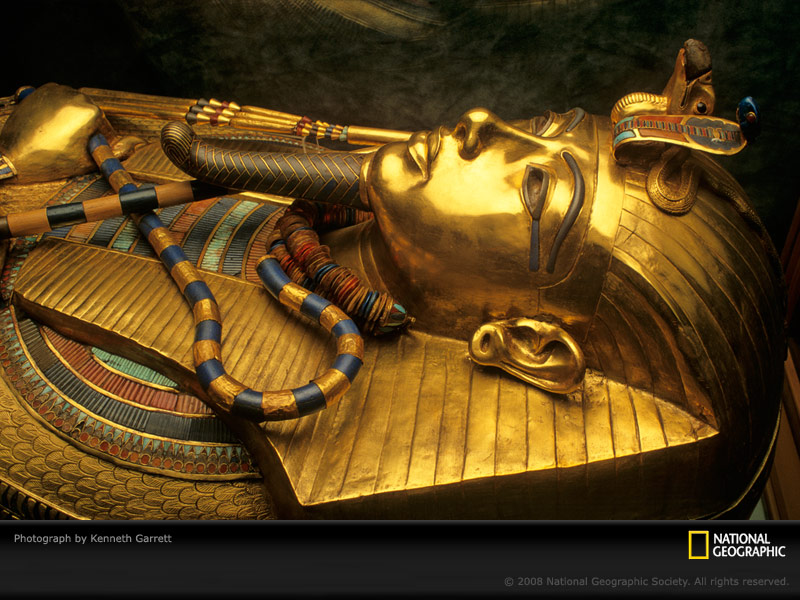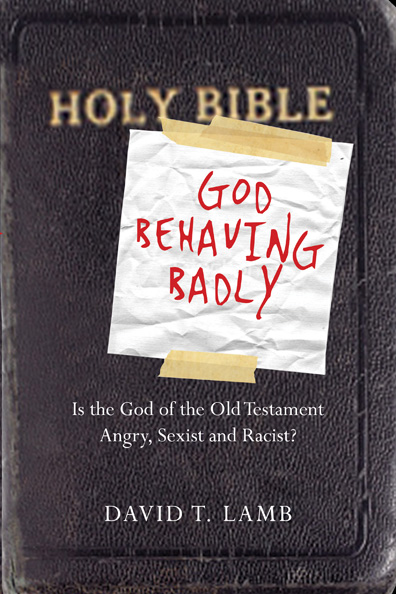Review: God Behaving Badly

From Marcion to Richard Dawkins, many have found the Old Testament troubling, not least for its Pandora’s box of ethical difficulties and the striking dissonance it generates when contrasting its patterns and ideas of morality with those of Jesus in the gospels. The God of the Old Testament is portrayed as bloodthirsty and capricious, jealous and vengeful, sexist and provincial, not to mention exhaustingly legalistic, while the New Testament’s protagonist comes off rather as an ethical savant, whose preachments and parables fare more admirably up against modern criticism. And this inter-testament discord has created tensions which persist to this day. This “disturbing divine behavior,” as Old Testament studies professor Eric Seibert labels it in his 2009 book of the same name, is one of the major strains of polemic featured in the rhetoric of New Atheists like Dawkins and Sam Harris.
To illustrate the depth of the problem, consider the following observation by nonviolent activist Walter Wink, summarizing an analysis by Raymund Schwager, prominent Catholic priest and theologian of the previous century:
Most Christians are at least aware of the multiplicity of sordidness lining their source texts, yet few have either the desire or the resources to properly engage them. As a result, Christians often choose to ignore them completely, preferring to decamp to the New Testament where they can find refuge in the magnetic miracle-workings of Jesus. Or, rather, they assume their pastors and theologians have come up with tidy and impervious answers to soothe all lingering doubts. Yet the question echoes, if not throughout the halls of seminaries but in the minds of sincerely questioning believers: What are we to make of a book which depicts God as an ally to slavery, genocide, misogyny, and prodigious violence?
A recent attempt to defuse these perennial concerns is David Lamb’s 2011 apologia, God Behaving Badly: Is the God of the Old Testament Angry, Sexist and Racist? As Lamb makes clear at the outset, Christianity is no stranger to these questions: “[The idea that] the Bible condones violent, sexist or racist behaviors are problems that Christians and the church have struggled with since the time of Christ.” (p. 178) Lamb invites his readers to wade with him into the dark, tempestuous waters of the Old Testament and explore these questions on a more contextual level. With clear and accessible prose Lamb shoulders the unenviable task of navigating this theological minefield and resolving the ostensible split personality of the biblical God.
The extent to which he succeeds may depend on your starting assumptions. Unfortunately, Lamb too often seems shackled by theological — or perhaps professional — restraints in GBB. Lamb holds professorship at Biblical Theological Seminary in Pennsylvania, a conservative evangelical institution. While the book should be commended for not shying away from the most troublesome portions in the texts, it stops well short of deviating from the orthodoxy of evangelical tradition. Unlike many of his colleagues, Lamb is firmly unwilling to allegorize, lend an ear to mythology, or consult modern evidences, preferring instead to defend the actions and directives attributed to God by any means necessary. That said, his uneasiness with many of the passages is on full display, and he harbors no illusions that his case can completely vindicate the God of the Old Testament.
Lamb’s basic approach is to first examine each contentious narrative through the lens of Near Eastern culture and the broader themes he sees operating in the Bible, and next to point to examples of God behaving in a manner we would likely applaud. I will address a variety of these below, but here I must point out that lining up the good acts next to the bad, as if to countervail the grotesque with the gregarious, doesn’t address the riddle of the book’s title. At bottom, this merely serves to establish that God, like us, is prone to mistake. We humans are not above committing error and are far from perfect. Yet fallibility runs counter to our expectations of God, who is allegedly all-loving, perfect, and therefore above the commission of ethical lapses. The dispute is not whether there exist traces of divine benevolence but over the instances of divine faux pas littering the canon. I felt that these codas to each chapter were out of place, as they did little to minimize the anxiety brought about by the passages where God indeed “behaves badly.”
Divine Anger
In various sections Lamb takes up the issue of God’s sporadically stroppy nature in the Old Testament. From the destruction of the cities of Sodom and Gomorrah, Onan, Judah’s son Er, and the firstborn of every Egyptian family, to engulfing Aaron’s sons with flames and drowning all life with an earthwide flood, God smites and afflicts with such regularity in the Old Testament that he makes 20th century dictators appear fractionally pacifistic.2
Lamb zeroes in on the stories of Uzzah and the bear incident at Bethel. We’ll begin with Uzzah (2 Sam 6:5-8, and recounted in 1 Chr. 13:9-10). In this multiply attested story God kills the porter Uzzah for steadying the ark of the covenant, a sacred vessel housing the tablet-inscribed Ten Commandments. This appears to be a classic example of the punishment not fitting the crime, especially given the justification in the text. Lamb deescalates by pointing out how important the transport of the ark was to God, evidenced by God’s detailed and repeated instruction for its handling in the previous chapters. “In Uzzah’s case, Yahweh was mad because his people weren’t following his instructions.” (p. 42) I’m not sure a failure to comply with instructions warrants a death sentence. You be the judge.
Lamb offers a second defense in that the smiting of Uzzah was necessary because the ark was symbolic of the Israelites’ relationship with God. Lamb asks us, “Would you want to follow a God that wasn’t passionate about his relationship with you?” (p. 33) Not necessarily, but one can show passion without committing murder. Apparently Lamb would have us believe the two go hand in hand. Of course, where there is no life, there is no relationship to be had. I’m not sure passion is due justification for murder. Do you?
Elisha and the Bears

The story of Elisha and the mauling of the 42 boys is undoubtedly one of the more bizarre passages in all of the Bible. It offends our moral sensibilities in ways few can match. True to form, Lamb does not back down from his literalist bent, refusing to entertain the idea that such an event may be ahistorical and instead assesses the passage within the broader context of the prophetic commission of Elisha.
He marshals three defenses here:
- He claims that Hebrew etymology indicates the tormentors were teenagers, not boys. “Thus, this was not harmless teasing by a group of pre-schoolers, but serious taunting by a pack of teens.” (p. 96)
- He claims such a response was culturally normative. “People would be severely punished for insulting leaders, rulers, kings, etc. While in our 21st-century Western mindset it might seem like Elisha was overreacting, within his cultural context his behavior was justified.” (p. 97)
- He claims intervention was warranted given Elisha’s overall character; good offsets bad. “Even though the story of the bears is troubling to us, we will give Elisha the benefit of the doubt given all of his other amazing acts of compassion.” (pp. 97-98)
It must first be emphasized that it is not Elisha who is in need of defending in this scenario. I’m not aware of anyone who is able to summon hungry, vicious bears upon command, leaving the blood of these 42 boys on God’s hands alone. Thus any pleadings for Elisha are red herrings which obscure the divine component of the passage.
Secondly, the difference between “pre-schoolers” and “teenagers” seems like more temporizing by Lamb, as it fails to weigh in on the ethical justification for the action. The dilemma here is whether God’s malicious curse on 42 people (irrespective of age, gender, etc.) is defensible in light of the circumstances. Lamb contends that it was acceptable for Bronze Age Mediterranean cultures to react in this way and so it was for God. This principle simply does not hold up under closer scrutiny. It is culturally normative in a number of countries, for example, to mutilate the genitals of female minors and to keep humans as slaves in others. Are we to infer that practices such as these are also uniformly acceptable?
Lamb’s defense here and in other places portrays a God who operates according to the ethical codes of time and place and as opposed to an eternal, divine law. If Lamb’s hermeneutic is correct, one should then wonder how we are to determine whether any biblical laws, practices, or behaviors are relevant or authoritative today. If God’s law is continuous with man’s, moreover, how are we to distinguish between the two? For the Christian, these are questions worth considering.
Finally, Lamb’s third defense elides the many other possibilities wherein Elisha could continue in his mission while also saving the 42 boys from harm. God could have silenced the boys; God could have cursed them with blindness, as he did at Elisha’s request just a few chapters later; God could have deterred the parties from meeting. The ease with which we are able to come up with pacifistic scenarios casts light on the utter illogic of this passage.
Lamb makes several moral arguments in GBB that are so so weak they left me in a catatonic state as I struggled to connect them to reality. One such example is his wrestling with whether the boys were killed or merely “mauled”: “The text, however, doesn’t suggest death was the result; it simply states they were ‘mauled’ or ‘torn’.” (p. 98) If I were ever to stand trial, I’d want David Lamb on my jury. His overwhelming tendency to blur ethical lines is astounding.
On Egypt and Kim Jong-il

Lamb also weighs in on God’s treatment of Egypt, the central narrative of Exodus. To recast God in a just light, here Lamb must dwell not only on the deliverance of Israel but on the destruction of Egypt and her people. He must wrestle with why both were necessary. The heft of his argument is the following:
As with many other places in the book, this papers over several larger problems. The first is the notion of collective punishment. If Pharaoh was ultimately culpable, why rain down plagues and unleash suffering on the Egyptian people, who surely did not hold the Israelites’ freedom in their hands? Lamb does not even touch upon God’s murder of the firstborn child of all the families of Egypt, to say nothing of the animals that were also inexplicably massacred in the plague. Could God not have avoided all the bloodshed and simply willed the pharaoh to release the Israelites from captivity or changed the king’s mind? But in fact, Exodus tells us explicitly that God did the opposite: God “hardened Pharaoh’s heart,” on multiple occasions, prolonging Israel’s suffering.3
Lamb’s ill-considered parallel with Kim Jong-il also demands further reflection. If God belatedly stepped in today, should the entirety of North Korea suffer for the late despot’s misdeeds? Put simply, are the wrongs of a tyrannical dictator to be imputed to the nation as a whole? I should think not.
What’s most puzzling is that Lamb completely ignores the fact that the majority of biblical scholarship regards the Exodus narrative — including the centuries-long captivity, the wandering, and the divinely aided escape — as fabrications. No archaeological evidence of widespread Israelite enslavement and liberation has been found in Egypt, which presents an intriguing third option Lamb chooses not to engage.
Divine Sexism
Lamb also spends ample time defending the charges of biblical misogyny and sexism. Without reservation I found these sections to be the most poorly argued of the book, with the appeals ranging from elementary to intellectually insulting. We begin in Genesis, at the time of Eve’s creation.
I hardly think this convincing for readers searching sincerely for a rigorous treatment of these issues, but even worse, does this not establish sexism in the reverse (i.e., man’s inferiority to woman)? Lamb anticipates this by saying he doesn’t think so, but he doesn’t think the passage in question can be used to argue for the supremacy of man, either. You can decide whether this ad hoc argument holds any weight or if it is an example of reasoning gone wrong.
We then move to Genesis 3, where the curse of creation is detailed. The focus is verse 16 in which God proclaims that man will “rule over” the woman. Lamb pencils in a curious escape hatch for this one, claiming that this dictum only applied to Adam and Eve, not as a model for humanity writ large.
Not only does this not explain why in this specific instance the man is to rule over the woman, but this is not how tradition has read the Genesis story throughout history. Christian tradition has generally upheld the Eden narrative, whether literally or allegorically, as a means of explaining man’s sinful nature, solving the riddle of profuse evil and suffering. If Lamb is right, and this one inconvenient passage is to be found culturally specific to a single prehistoric couple, then is the rest of the surrounding narrative also? How much of Genesis, if any, applies beyond the idyllic fantasyland of Eden?
Worse, when Lamb tries to sync up his argument with the Pauline doctrine in Ephesians he directly contradicts himself by claiming that this rule only applies to married women, not single women. “So, this curse applies only to married women and not to women in general as a gender.” (pp. 56-57) So, which is it — Adam and Eve only, or all married couples?
At certain points, Lamb’s engagement of these issues just teeters off the rails:
I’m not sure curse length is as robust a metric as Lamb seems to think it is, and both men and women die and “return to the dust” as it were, so he is wrong to say that the man’s punishment is more severe. At any rate, what is the value in Lamb’s approach? Childbirth was and (and remains) a harrowing experience endured by women. Without anesthesia, antibiotics, transfusions, and other medical marvels, the likelihood that either the mother or the infant would not survive was dispiritingly high. (So high, in fact, that in Greco-Roman times it was law for women to have five children minimum just to maintain the population.) Perhaps what we’re seeing in Genesis is one Mesopotamian culture’s attempt to make sense of an ordeal that has haunted humanity through the ages. Other cultures offered different explanations, many of them mythological in nature. How does Lamb’s inflexibly literal formula help us better understand these passages?
Throughout the book, these and other selections are discussed in distinctly literal terms, intimating that something as established as evolution is completely off the table for Lamb. It never seems to occur to him that the deeply symbolic stories scattered up and down the texts might actually be taken symbolically. Nor does he give attention to the role of human authorship when reading these stories today. The rigidity of his approach may be in line with his tradition, but for those who accommodate a scientific view of the world, GBB will likely hold little, if any, sway.
Lot and His Daughters
One of the book’s fundamental problems is that the author repeatedly fails to engage the core ethical issues operating within the selected passages. This facile evasion of complexity reached a boiling point for me when juxtaposing his rebuttals to the story of Uzzah with the story of Lot’s daughters. Lamb lets God off the hook for striking down Uzzah because of the Israelites’ disobedience, yet sees no problem with God’s silence in the case of Lot offering his innocent virgin daughters to be raped, claiming “an absence of condemnation does not constitute an affirmation.” (p. 61) It’s true; the text never once condemns Lot for his barbaric proposal. God’s nonattendance is also noted in a strikingly similar story in Judges, which sees quite a different and utterly heart-rending fate for the female.
In this narratival pairing we see that God’s concern for the proper handling of the ark of the covenant is so great that several chapters are dedicated to it, including the extermination of one of its porters, yet there is no commentary or denunciation of the imminent rape of two blameless young girls. Lamb apparently sees no dissonance here.
On Forced Betrothal
Next up is the Deuteronomic laws which have rape victims marrying their transgressors, a prescription interspersed throughout but appearing most explicitly in Deut. 22. Lamb asks us to clear the room of our modern-day sensibilities to make space for the context of Near Eastern culture. When a woman was raped three thousand years ago, it was Bronze Age custom to confer an “untouchable” status upon her, an indelible stain that barred her from future marriage. These untouchables were forever stigmatized as damaged goods and excluded from attaining their one hope to escape penury. It is seen, thusly, by betrothing victim with malefactor, God has supposedly corrected a problem concentric to the ancient world.
Lamb esteems these commands as progressive and goes on to applaud the later decree that forbids rape victims from ever divorcing from this arranged marriage, pointing out that these women now had “a guarantee of future security that most women would not have.”
As if consigning an already desecrated female to a lifetime of misery and emotional turmoil weren’t abhorrent enough — to say nothing of consent or personal autonomy — Lamb’s assertion also strikes me as a failure to reason honestly. Human ethics, as manifest in the evolution of our legal systems, has ebbed and flowed with every generation, and many of the observed cross-cultural differences could be labeled ‘progressive’ in retrospect. After all, if our ethics never advanced, we would still be marrying victims to their rapists. Would we, by analogy, be mollified by a school with segregated classrooms in the 1960s implementing integrated bathrooms and water fountains? Would we label these institutions and policies progressive? Perhaps slightly, but such human measures should pale in comparison to the precedents laid down by an all-perfect Creator.
The contention raised by skeptics and reformist readers is not that some of the laws in the Old Testament weren’t progressive at all, but that they were not progressive enough. Given the extraordinary claims made on its behalf, the Bible must exhibit an ethical blueprint that transcends the rate of cultural evolution observed across history. On the issues of slavery,4 the status of women,5 penalties for various innocuous (and even imaginary) ‘crimes’,6 treatment of nonbelievers,7 and many others, the Old Testament is found to be, in a few cases minimally progressive, and in most cases par for the Bronze Age course. If these ancient texts were truly messages vouchsafed to humanity by a non-natural, all-loving agency, we should expect more than quasi-progress on ethical matters.
Divine Racism and Genocide
We now come to the quintessence of Old Testament difficulties: God siding with one race of people at the often genocidal expense of others. The Old Testament takes readers on a geographical tour of ruin mandated by God and carried out by the Israelite people. The Hittites, Amorites, Amalekites, Perizzites, Hivites, Jebusites — all are targets of God’s bloodlust.

The most troubling passages are those in 1 Samuel, Deuteronomy, [1, 2, 3] and Joshua [1, 2]. In 1 Samuel God commands Saul to enact genocide on the Amalekites. Here we see an image of God so uncompromising, so void of patience and mercy that he calls for the complete annihilation of an entire lineage of people, including the “women, children, and infants” — a recurring theme throughout the Old Testament. Lamb mines the text and tells us the catalyst for this deep and thorough hatred is that many of these tribes attacked first, upon the Israelites’ departure from Egypt.
Lamb’s rush to the defense of Israel does little to exonerate God, especially considering the prior mention of collective punishment where even the innocent are condemned to death for the putative sins of others sharing the same territory. We see on multiple occasions the divine directive to kill infants and children. Was there no other way to resolve territorial disputes than by slaughtering babies?
Lamb also does not engage the most frequent justification for genocide given in the text itself: the worship of other gods, as we are repeatedly told.8 The fear of Israel serving a different god seems to press heavier on Yahweh’s mind than his concern for the well-being of entire populations. To be sure, the penalties prescribed for nonbelievers throughout the Torah are unambiguous (although, amusingly, they are in conflict with those given at Mt. Sinai [1, 2].) Was it any more ethical to kill an Egyptian pagan in 2400 BCE than it is for a Christian to kill a Muslim today, solely for the belief in different deities?
Lastly, Lamb defends the conquest and occupation narratives found in Joshua by applying a moral relativism sticker to them. He contrasts the biblical accounts with those of Assyria and Moab:
The passage above touches on an important issue within moral philosophy: the ethics of, say, colonialism, and the extent to which it changes under divine command. Lamb appears to be making the case that it’s fine if you take the lives of women and children, or anything else for that matter, so long as you are being obedient to God’s commands (bringing to light a moral dilemma dating back to Socrates).
Never mind the murder, Lamb seems to be saying; just don’t spice up your written exploits with bloody details because that’s a bridge too far. For those who find Lamb’s arguments amenable, simply read Joshua (here and here) and the other conquest narratives in the Bible for yourself and see whether the accounts are bereft of brutality and indiscriminate violence. Spoiler: They aren’t. Incidentally, most Old Testament scholars reject the historicity of the Joshua occupation narrative as well, but you won’t get any hint of that here.
When God Doesn’t Smite
As a kind of counterweight to the reprehensible dramas presented in the book, Lamb peppers the text with examples of God’s apparent goodness. One in particular he finds commendable is God’s “slowness to anger,” evidenced by the 400 years of Israelite enslavement until such time that God exacted his revenge on the locals. Lamb seems not to recognize that the temporal aspect of God’s actions and mandates is wholly extrinsic to their ethical nature. If a father batters and bruises his ten year-old son, is the act more moral if it was preceded by several years of kindness and patience? Likewise, does the moral inadequacy of the murder of an infant hinge upon whether it occurred in 2600 BCE or 2200 BCE?
Lamb gives several other offbeat examples of where God changes his mind and foregoes smiting his people, such as the golden calf incident in Exodus. As before, this does nothing to relieve us of the image of God as a mercurial spouse prone to explosive fits of violence and anger. To put it bluntly, should the momentary hints of God’s kindness and goodwill embedded within the Old Testament alleviate our concerns for the litany of violence and moral destitution any more than they would in the case of a live-in spouse or father? These are questions worth considering.
Closing Thoughts
While Old Testament ethics and violence is an interesting topic to explore, God Behaving Badly is a poorly argued and inconsistent contribution to the body of literature. At best it fails to offer defensible answers to thinking Christians and does nothing to defray the prosecutorial rhetoric of Dawkins and the New Atheist contingent. At worst it muddles the academic conversation on these topics.
The most glaring scar defacing the book is how the author glides over larger problems in an attempt to match up his theology with the text, rather than using the text in concert with basic reasoning and the broad tapestry of extra-biblical material to inform his theology. As a result, Lamb’s solutions are often appallingly superficial and cannot be consistently applied to modern times. Rather than engage the views of his colleagues and prominent skeptics, Lamb appears to follow too closely in the footsteps of his professional commitments by refusing to bring scientific evidence into his analysis and altogether avoiding alternative, non-literalist hermeneutics.
For Christianity to remain relevant on the global stage, it must examine its theology as new evidence and information arise. It cannot continue to live in the first century and appeal to people living in the twenty-first. While there may be cogent responses to the ethical affronts of the Old Testament, they aren’t to be found here.
Note: This review is mirrored over at Amazon and Goodreads.
- Walter Wink, “The Powers That Be: Theology for a New Millennium,” Galilee Doubleday, (1998), pp. 84, 85.
[↩]
- More disturbing behavior: Numbers 15:32-36; Numbers 14:35-37; Numbers 16:31-35; Numbers 21:4-6; Numbers 25:6-13; Isaiah 37:36; 2 Kings 1:9-12; 1 Samuel 6:19; 1 Samuel 25:38-39; 2 Samuel 12:14-18; Leviticus 26:1-46; Deuteronomy 28:15-68; 29:1; Deuteronomy 32:39-42; 2 Samuel 24:1-17
[↩]
- Exodus 14:8-9; Exodus 9:11-12
[↩]
- Slavery in the Old Testament: Exodus 21:20-21; Leviticus 25:44-46; Exodus 21; Deuteronomy 20:10-11; Leviticus 19:20-22; 1 Kings 4
Slavery in the New Testament: Matthew 24:45-51; Luke 12:42-48; 1 Corinthians 7:17-21; Colossians 3:18-24; Colossians 4:1; Ephesians 6:5-9; 1 Timothy 6:1-2; 1 Peter 2:18; Titus 2:9-10
[↩] - Numbers 31:17-18; Leviticus 12:1-5; Leviticus 21:9; Deuteronomy 21:10-14; Deuteronomy 22:13-21; Deuteronomy 22:28-29; Judges 19:23-29; 1 Timothy 2:8-15; 1 Corinthians 11:3-10; 1 Corinthians 14:33-35; Colossians 3:18; 1 Peter 3:1-7; Ephesians 5:22-24
[↩]
- Deuteronomy 21:18-21; Exodus 35:2; Exodus 31:12-15; Deuteronomy 17:12; Leviticus 20:9; Leviticus 20:27; Exodus 22:18; Leviticus 11:9-12; Leviticus 20:13; Leviticus 24:11-16
[↩]
- Deuteronomy 13:6-18; Deuteronomy 17:2-5; 2 Chronicles 15:13; 2 Corinthians 6:14; 2 John 7-11
[↩]
- Exodus 23:32-33; Exodus 34:12-16; Deuteronomy 13:6-18; Deuteronomy 7:1-4; Deuteronomy 20:16-18; Numbers 25:1-5
[↩]



Comments